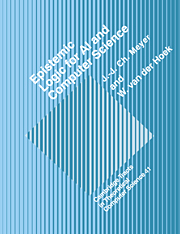PREFACE
Published online by Cambridge University Press: 11 November 2009
Summary
Epistemic logic concerns the notions knowledge and belief ('επιστημη — episteme — is Greek for ‘knowledge’), and stems from philosophy where it has been developed to give a formal treatment of these notions. (Sometimes the logic of belief is separately referred to as doxastic logic, from the Greek word δoξα — doxa —, meaning ‘surmise’ or ‘presumption’. In this book we shall use epistemic logic for the logic of knowledge and belief.) In [Hin62] the Finnish logician and philosopher Jaakko Hintikka presented a logic for knowledge and belief that was based on modal logic. Modal logic is a so-called philosophical logic dealing with the notions of necessity and contingency (possibility) ([Kri63], [Che80], [HC68, HC84]), and it appeared that epistemic logic could be viewed as an instance of this more general logic by interpreting necessity and possibility in an epistemic manner. For a thorough treatment of epistemic logic from the perspective of philosophy we refer to [Len80].
Especially in the last decade the use of logic and logìcal formalisms in artificial intelligence (AI) has increased enormously, including that of those logics that have been developed originally in and for philosophy. Epistemic logic is one of these so-called philosophical logics that has been ‘discovered’ by computer scientists and AI researchers. Particularly, the relevance of epistemic logic has been realised by researchers interested in the formal description of knowledge of agents in distributed and intelligent systems in order to specify or verify protocols, and represent knowledge and formalise reasoning methods, respectively.
- Type
- Chapter
- Information
- Epistemic Logic for AI and Computer Science , pp. xi - xivPublisher: Cambridge University PressPrint publication year: 1995

